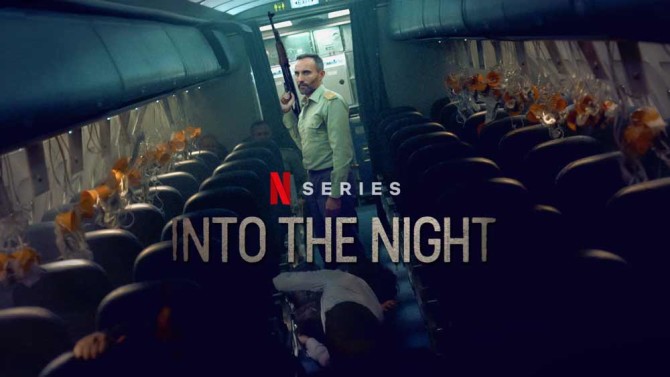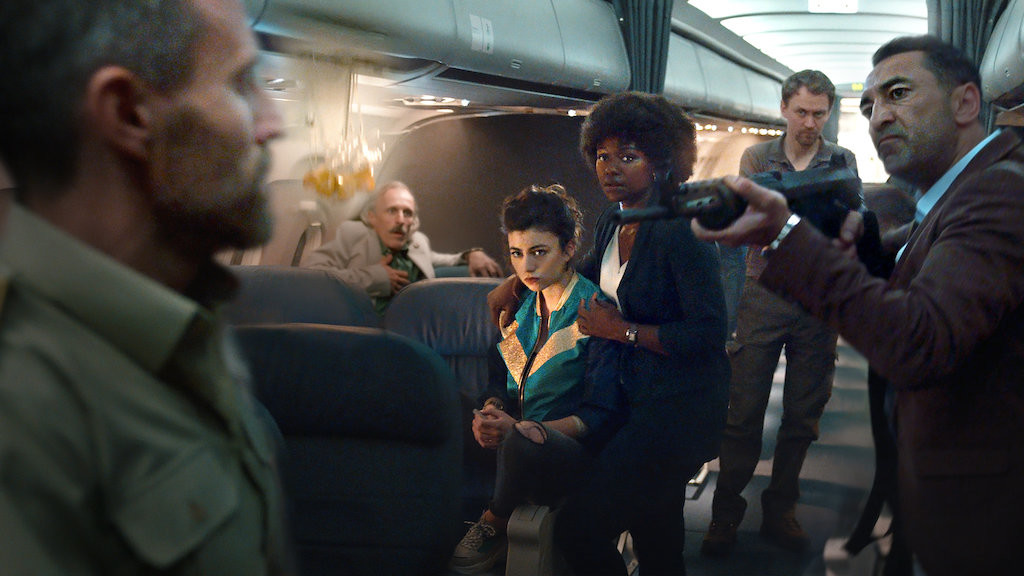Is Into the Night the next Lost?
Genre: Sci-Fi (TV show)
Premise: (from IMDB) When a mysterious cosmic disaster strikes Earth, survivors on an overnight flight from Brussels race to find refuge and escape the sun’s rays.
About: This show premiered on Netflix last week and I’d been hearing whispers that it was good. It’s a Belgium show and the characters speak French, which has limited its audience here in the U.S. Jason George, the creator, seems to have a prominent TV career in Belgium as he’s produced a lot of shows. His one American credit comes as a producer on the Adam McKay movie, Vice.
Writer: Jason George
Details: I watched the first 2 episodes of the 6 episode series (each ep is about 40 min long)
I love high concept TV shows and I love plane-related concepts so this was right up my alley. It had just a hint of Lost in it, and a hint of Lost is better than a shout of all these other excuses for TV shows I’ve seen lately.
I suspect that the show, which is really good, hasn’t gotten enough attention due to its subtitles. And I get it. I’m resistant to subtitles as well. The only time I’ll watch something with subtitles if I’ve been told that it’s GREAT or it has a really high concept, like today’s show.
But I was thinking to myself, why do you hate subtitles so much these days, Carson? You’ve always disliked them, but it’s never been this bad. And then it hit me. It’s because YOU ACTUALLY HAVE TO PAY ATTENTION TO A MOVIE WITH SUBTITLES.
We’ve grown so accustomed to multi-tasking, playing on our tablets and phones while watching something, that we’ve grown this second-sense ability to keep up with the movie by listening to the dialogue in the background.
But you can’t do that with a subtitle movie. You have to pay attention THE WHOLE TIME to know what’s going on. That’s why we resist these things so much. Unlike regular movies, they force us to actually pay attention. You know, the way movies were actually meant to be watched.
Into the Night starts innocently enough at a Brussels airport. It’s an early morning flight to Moscow, before the sun has come up. People are arriving. They’re just starting to board. A nervous looking man, Terenzio, notices reports on the television of people dropping dead in Asia.
He leaps up, surprises a guard, grabs his rifle, then charges onto the boarding plane. The captain isn’t even on the plane yet. Only the co-pilot, Mathieu. He tells Mathieu to fire up the engines, they need to get out of here now, before the sun rises. Mathieu has no idea what’s going on but when you’ve got a rifle in your face, you do as you’re told.
The plane takes off and Terenzio tries to explain to the passengers (about 20 of them made it on) that the second the sun rises, everybody dies. Doesn’t matter if they’re above ground or below it. Something about intense gamma rays. Of course no one believes him. And since the wifi is down, it’s impossible to confirm the claim.
The plane detours to Iceland to refuel only to find that the entire airport is on fire. So they head to Northern Scotland instead and land at a remote airport. It’s there where they find out Terenzio’s claims are true. The last article on the event, posted an hour ago, says it has something to do with a polarity change in the sun.
The group inherits three new passengers, a group of suspicious Irish military men, and off they head to the next airport. In addition to our pilot and former terrorist, we have Sylvie, a helicopter pilot who just lost her husband to cancer, Ayaz, an alpha male businessman, Rik, a jumpy older man who seems to be hiding some information of his own, a mother and her lung-challenged son, an old Russian man with dementia, a mechanic who got stuck on the plane, and Ines, a social media influencer.
As the group troubleshoots immediate problems such as fuel supply, a faulty radio, and which airports to keep jumping to, they must ultimately figure out what’s going on with the sun, and if their desperate attempts to stay alive are simply prolonging the inevitable. That, sooner or later, the sun will catch up to them.
I’m two episodes in and, so far, this show is great!
We talk a lot about urgency here at Scriptshadow. It’s one of the best ways to add tension and momentum to your story. Well what’s more urgent than constantly having a killer sun on your tail, always only a couple of hours from catching up to you? You can feel the clock ticking in every one of these scenes.
I was a little worried about how they were going to explain away these rays. How would a sunrise kill someone? Especially someone who’s downstairs in a basement with no direct contact with light? But they cover that quickly, explaining that an intense polarity event has caused the sun to emit unseemly amounts of gamma rays, which they believe is what’s killing people.
It might not work for some (I know the usual suspects in the comments section will go ape-doodoo) but I’ll just say watch it before you knock it. They do something really smart in that they don’t OVER-DESCRIBE the problem. That’s where a lot of writers get into trouble. It’s like when you oversell a lie. The more you go on and on about it, the more it looks like you’re lying. The explanation here is short and succinct and just convincing enough that we go with it.
One thing I always find interesting about these concepts is that you have to begin the catastrophe to start the characters on their journey but the catastrophe can’t be too big to the point where the characters wouldn’t realistically go on the journey.
If billions of people are dying all over the planet, there isn’t going to be a Brussels to Moscow flight. I’m sorry but there just wouldn’t be. So the writer has to walk this line of beginning the catastrophe to set up the story but have it happen JUST AS they’re getting on the plane so it’s still believable that the flight would happen.
George definitely fudged some of the timing but the plane take-off was such a frantic sequence that we overlooked it.
I only bring this up because these are the little things screenwriters have to deal with that the average viewer never thinks about. However, if you get it wrong, it could easily break the suspension of disbelief. So the writer has to spend a lot of time thinking about.
If people die the second the sun rises, that means tens of millions of people are dying all at once. And every 30 minutes, tens of millions more are dying. Why would an airport still be scheduling flights when 100 million people just died an hour ago?
But Into the Night makes up for it in the story details, which George is quite good at. For example, I love the fact that the pilot isn’t yet on the plane. Only the co-pilot is. It’s always more interesting when the less experienced guy is put in charge.
And when the co-pilot calls for a co-pilot of his own from the passengers, the only passenger who can help isn’t even an airplane pilot. She’s a helicopter pilot. Again, you want to keep adding UNCERTAINTY to the equation. The more uncertain you can make things, the more drama you’re going to get.
If this plane was piloted by an all-star pilot who spent five tours in Afghanistan and he was known as the best pilot in the world, we’d all feel safe. We’d feel he’d be able to steer us out of this. It’s putting the flawed and unsure character in charge that creates our uncertainty, that keeps us off-balance and wondering how in the world they’ll be able to pull this off.
The show is also very good at keeping its characters busy with tasks. There’s a broken radio that needs fixing. There’s a passenger who’s sick. There’s refueling that needs to be done at every airport. There’s food that needs to be restocked. Remember, characters are most interesting when they’re being ACTIVE and the way you make characters active is by giving them things to do.
Into the Night does this well and it means that, so far, the episodes are vibrant and alive.
One last thing I want to point out. The social media influencer character here, Ines. I’ve started to see this character pop up A LOT in scripts lately. And almost every time, it feels like the writer has never spent more than a couple of minutes on an influencer’s page.
As a result, the character comes across as lazy, dishonest, and cliched. Remember, the quickest way to any cliched character is writing about something you know nothing about. You will always default to the broadest strokes of that character because the broad strokes are all that you know. The key to characters that pop is the opposite. You must be specific about them. So if you’re going to include a social media influencer, go do a lot of research on social media influencers. Don’t just write what you THINK a social media influencer’s life would be like cause it’s guaranteed to come off as cliched.
Into the Night is worth checking out. Can’t wait to watch the last four episodes.
[ ] What the hell did I just stream?
[ ] wasn’t for me
[xx] worth the stream
[ ] impressive
[ ] genius
What I learned: A nice hack is to make the cliched character (aka the social media influencer) the opposite of the general perception. So, if you have a beautiful female social media influencer, don’t make her flashy and bitchy. Make her introverted and shy, the opposite of her big online personality.



